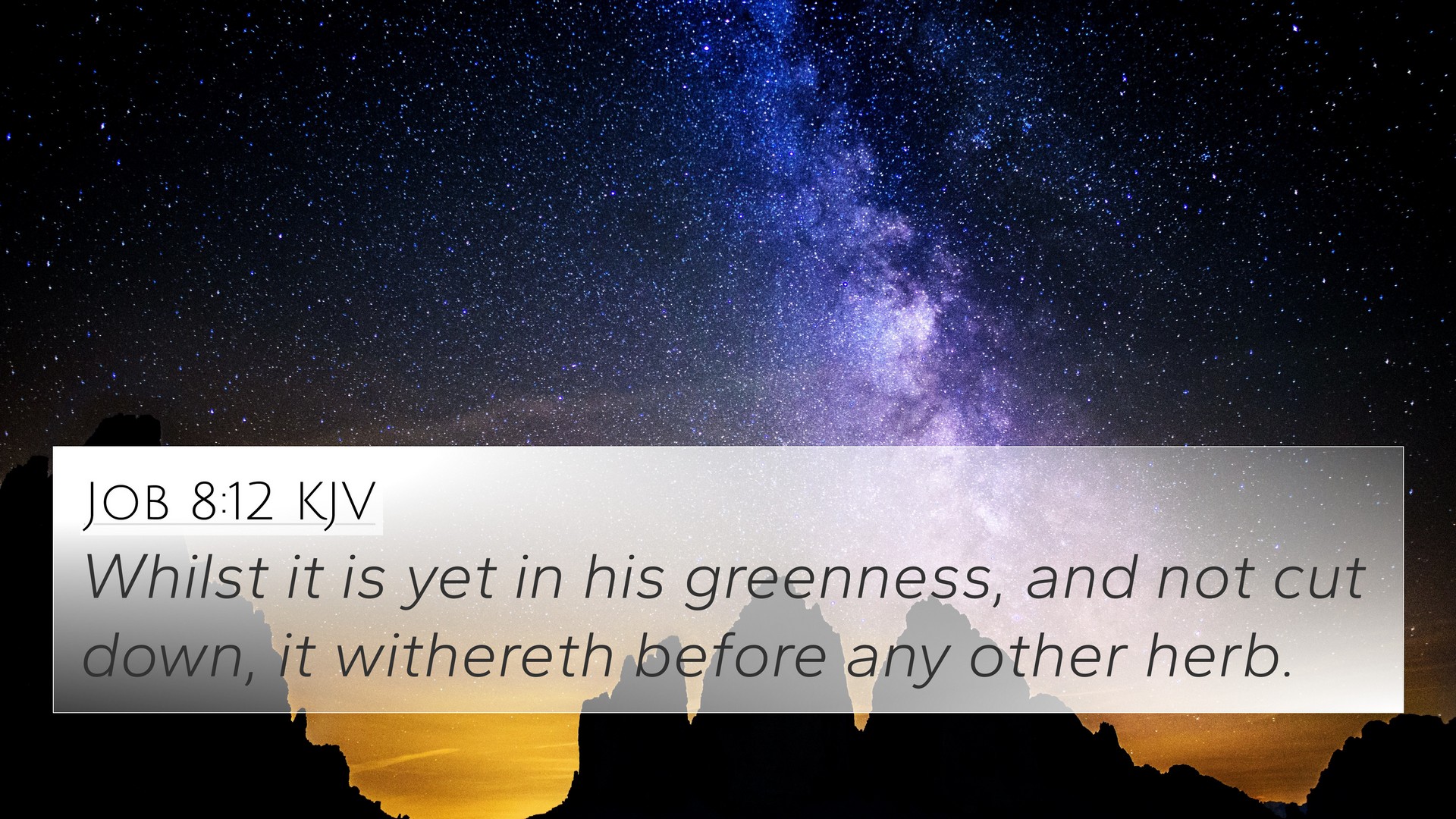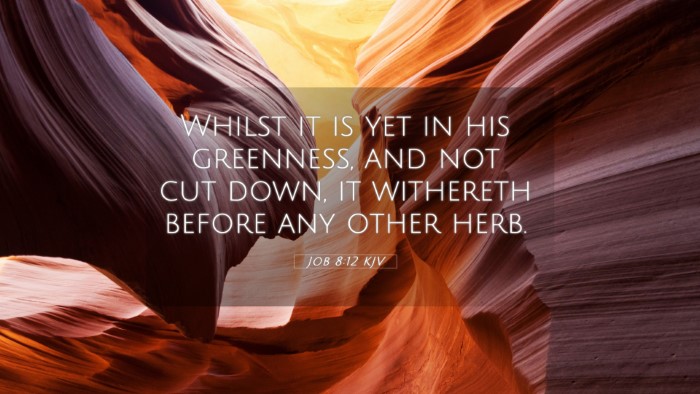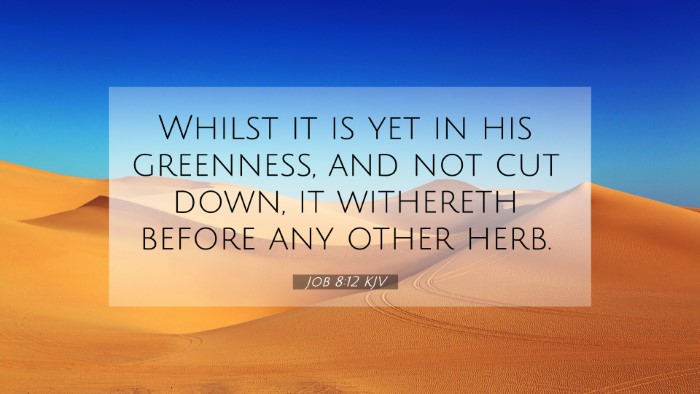Old Testament
Genesis Exodus Leviticus Numbers Deuteronomy Joshua Judges Ruth 1 Samuel 2 Samuel 1 Kings 2 Kings 1 Chronicles 2 Chronicles Ezra Nehemiah Esther Job Psalms Proverbs Ecclesiastes Song of Solomon Isaiah Jeremiah Lamentations Ezekiel Daniel Hosea Joel Amos Obadiah Jonah Micah Nahum Habakkuk Zephaniah Haggai Zechariah MalachiJob 8:12 Similar Verses
Job 8:12 Cross References
Whilst it is yet in his greenness, and not cut down, it withereth before any other herb.
Uncover the Rich Themes and Topics of This Bible Verse
Listed below are the Bible themes associated with Job 8:12. We invite you to explore each theme to gain deeper insights into the Scriptures.
Job 8:12 Cross Reference Verses
This section features a detailed cross-reference designed to enrich your understanding of the Scriptures. Below, you will find carefully selected verses that echo the themes and teachings related to Job 8:12 KJV. Click on any image to explore detailed analyses of related Bible verses and uncover deeper theological insights.
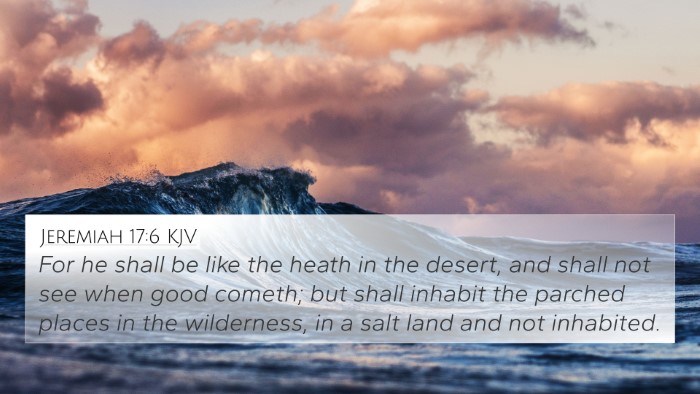
Jeremiah 17:6 (KJV) »
For he shall be like the heath in the desert, and shall not see when good cometh; but shall inhabit the parched places in the wilderness, in a salt land and not inhabited.
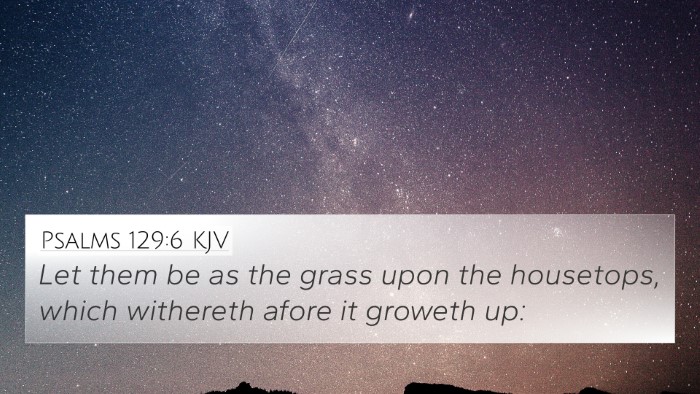
Psalms 129:6 (KJV) »
Let them be as the grass upon the housetops, which withereth afore it groweth up:
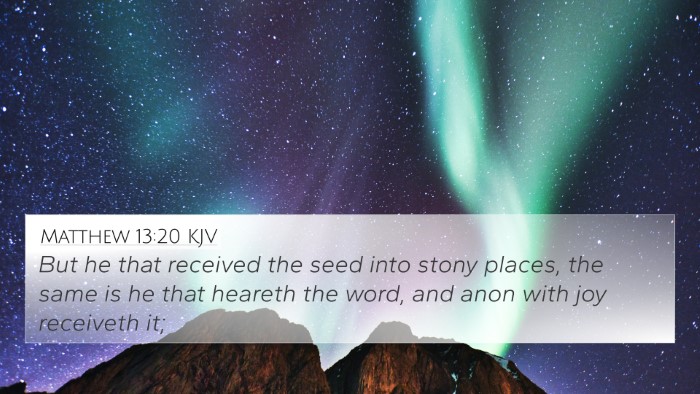
Matthew 13:20 (KJV) »
But he that received the seed into stony places, the same is he that heareth the word, and anon with joy receiveth it;
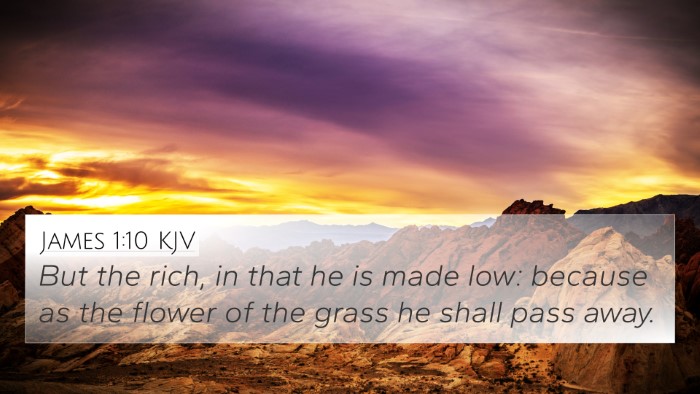
James 1:10 (KJV) »
But the rich, in that he is made low: because as the flower of the grass he shall pass away.
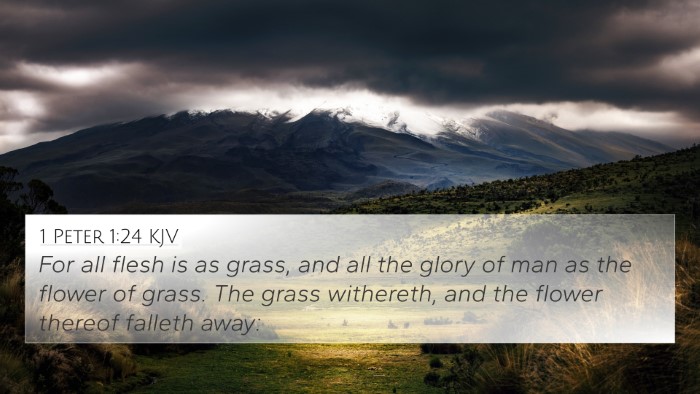
1 Peter 1:24 (KJV) »
For all flesh is as grass, and all the glory of man as the flower of grass. The grass withereth, and the flower thereof falleth away:
Job 8:12 Verse Analysis and Similar Verses
Understanding Job 8:12
Job 8:12 states, "Whilst it is yet in his greenness, and not cut down, it withers before any other herb." This verse reflects the brevity and fragility of life, using the metaphor of a plant to illustrate the vulnerability of human existence.
Contextual Significance
In the grand narrative of the book of Job, this verse is part of the speech by Bildad the Shuhite, who emphasizes the need for righteousness. It is essential to understand how this verse fits within Job’s responses to the trials and suffering he experiences.
Commentary Insights
Insights from public domain commentaries reveal several key themes in Job 8:12:
-
Human Frailty:
Matthew Henry emphasizes the fleeting nature of life, comparing it to the short-lived plant that withers quickly without strong roots. This serves as a reminder of the transient nature of human efforts and aspirations.
-
Righteousness and Consequences:
Albert Barnes notes that Bildad is arguing for the principle that the wicked will inevitably face destruction, whereas the righteous will endure. The metaphor of a withering plant serves to illustrate this principle.
-
Hope and Restoration:
Adam Clarke suggests that this verse also points to the possibility of revival and hope for those who seek righteousness, contrasting the withering herb with the potential for renewed life through God's mercy.
Cross-References and Thematic Connections
Job 8:12 has numerous Bible verse parallels and cross-references that enrich its understanding:
- Psalm 103:15-16 - "As for man, his days are as grass: as a flower of the field, so he flourisheth. For the wind passes over it, and it is gone; and the place thereof shall know it no more." A clear connection illustrating the brevity of life.
- Isaiah 40:6-8 - "The voice said, Cry. And he said, What shall I cry? All flesh is grass, and all the goodliness thereof is as the flower of the field." This emphasizes the transitory nature of human existence.
- James 1:10-11 - "But the rich, in that he is made low: because as the flower of the grass he shall pass away." James reinforces the theme of the impermanence of worldly status.
- Matthew 6:30 - Jesus compares human concerns to the lilies of the field, which are here today and gone tomorrow, reminding us of God's control over life’s brevity.
- 1 Peter 1:24-25 - "For all flesh is as grass, and all the glory of man as the flower of grass. The grass withers, and the flower thereof falls away: But the word of the Lord endureth forever." This emphasizes the eternal nature of God's word compared to our fleeting lives.
- Proverbs 27:1 - "Boast not thyself of tomorrow; for thou knowest not what a day may bring forth." This reinforces the uncertainty of life, akin to the withering herb.
- Ecclesiastes 3:20 - "All go unto one place; all are of the dust, and all turn to dust again." The cyclical nature of life and death resonates with the metaphor used in Job 8:12.
Interpretive Applications
Understanding Job 8:12 can benefit from various cross-referencing Bible study methods:
- Use a Bible concordance to explore themes related to life’s brevity.
- Employ a cross-reference Bible study guide to connect Job’s suffering with other scriptural themes of endurance and faith.
- Utilize Bible reference resources to deepen your exploration of life metaphors in scripture.
- Conduct a comparative study of Pauline epistles that highlight human struggle and divine hope.
Conclusions
The profound implications of Job 8:12 urge believers to reflect on the nature of life, emphasizing the importance of grounding one's existence in righteousness amidst its fleeting and often uncertain nature. The interconnectedness of scripture reveals not just isolated wisdom but a unified message about the human condition and divine providence.
Further Study Opportunities
For those interested in deeper explorations of scripture, consider investigating:
- How to find cross-references in the Bible for a broader understanding of biblical themes.
- Cross-referenced themes in the Bible that connect the Old and New Testament narratives.
- Exploring links between the Prophets and Apostolic teachings to grasp the continuity of God's message.
By engaging with these cross-references, one can enrich their understanding of Job 8:12 and its implications for faith and perseverance through adversity.
